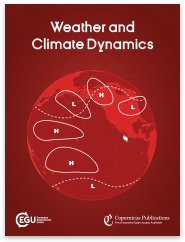
Executive editors: Camille Li, Stephan Pfahl & Heini Wernli
eISSN: WCD 2698-4016, WCDD 2698-4024
Weather and Climate Dynamics (WCD) is a not-for-profit international scientific journal dedicated to the publication and public discussion of high-quality research on dynamical processes in the atmosphere. It represents a timely effort to establish a seamless perspective on atmospheric flows, on scales from weather to climate (minutes to decades). The scope of the journal includes the following: the dynamics of extreme weather events (case studies and climatological analyses); weather system dynamics in tropical, midlatitude and polar regions; interactions of atmospheric flows with cloud physics and/or radiation; links between the atmospheric water cycle and weather systems; tropical-extratropical and midlatitude-polar interactions; atmospheric teleconnections and stratosphere-troposphere coupling; boundary-layer dynamics and coupling to land, ocean and ice; atmospheric variability and predictability on time scales from minutes to decades; storm track and Hadley cell dynamics; role of atmospheric dynamics in paleoclimate and climate change projections; and other aspects of weather and climate dynamics. Theoretical studies, idealized numerical studies, full-physics numerical studies, and diagnostic studies using (re)analysis and/or observational data are welcome.
Journal metrics
WCD is indexed in the Web of Science, Scopus, Google Scholar, etc. We refrain from displaying the journal metrics prominently on the landing page since citation metrics used in isolation do not describe importance, impact, or quality of a journal. However, these metrics can be found on the journal metrics page.
24 Feb 2026
The role of the stratospheric state in upward wave flux prior to Sudden Stratospheric Warmings: a SNAPSI analysis
Blanca Ayarzagüena, Amy H. Butler, Peter Hitchcock, Chaim I. Garfinkel, Zac D. Lawrence, Wuhan Ning, Philip Rupp, Zheng Wu, Hilla Afargan-Gerstman, Natalia Calvo, Alvaro de la Cámara, Martin Jucker, Gerbrand Koren, Daniel De Maeseneire, Gloria L. Manney, Marisol Osman, Masakazu Taguchi, Cory Barton, Dong-Chan Hong, Yu-Kyung Hyun, Hera Kim, Jeff Knight, Piero Malguzzi, Daniele Mastrangelo, Jiyoung Oh, Inna Polichtchouk, Jadwiga H. Richter, Isla R. Simpson, Seok-Woo Son, Damien Specq, and Tim Stockdale
Weather Clim. Dynam., 7, 411–437, https://doi.org/10.5194/wcd-7-411-2026,https://doi.org/10.5194/wcd-7-411-2026, 2026
Short summary

23 Feb 2026
The Dual Effect of Urban Areas on Supercell Storms
Francesco De Martin, Christopher Rozoff, Andrea Zonato, Stefano Alessandrini, and Silvana Di Sabatino
EGUsphere, https://doi.org/10.5194/egusphere-2026-815,https://doi.org/10.5194/egusphere-2026-815, 2026
Preprint under review for WCD (discussion: open, 0 comments)
Short summary
20 Feb 2026
Meteorological Drivers of Extreme Swells on the Peruvian Coast
Gonzalo Agurto, Soledad Collazo, and Ricardo García-Herrera
EGUsphere, https://doi.org/10.5194/egusphere-2026-408,https://doi.org/10.5194/egusphere-2026-408, 2026
Preprint under review for WCD (discussion: open, 2 comments)
Short summary
19 Feb 2026
Extratropical teleconnections in a multi-model ensemble nudged towards the observed QBO
Martin B. Andrews, Neal Butchart, James A. Anstey, Ewa Bednarz, Dillon Elsbury, Jorge L. García-Franco, Vinay Kumar, Froila M. Palmeiro, Natasha E. Trencham, Kohei Yoshida, Zhaoyang Chai, Dong-Chan Hong, Kai Huang, Aleena M. Jaison, Yoshio Kawatani, Jeff R. Knight, Pu Lin, François Lott, Yixiong Lu, Hiroaki Naoe, Scott M. Osprey, Jadwiga H. Richter, Federico Serva, Seok-Woo Son, Qi Tang, Shingo Watanabe, and Jinbo Xie
EGUsphere, https://doi.org/10.5194/egusphere-2026-737,https://doi.org/10.5194/egusphere-2026-737, 2026
Preprint under review for WCD (discussion: open, 0 comments)
Short summary
Highlight articles
21 Oct 2025
Estimating return periods for extreme events in climate models through Ensemble Boosting
Luna Bloin-Wibe, Robin Noyelle, Vincent Humphrey, Urs Beyerle, Reto Knutti, and Erich Fischer
Weather Clim. Dynam., 6, 1147–1177, https://doi.org/10.5194/wcd-6-1147-2025,https://doi.org/10.5194/wcd-6-1147-2025, 2025
Short summary
05 Sep 2025
CYCLOPs: a Unified Framework for Surface Flux-Driven Cyclones Outside the Tropics
Kerry Emanuel, Tommaso Alberti, Stella Bourdin, Suzana J. Camargo, Davide Faranda, Emmanouil Flaounas, Juan Jesus Gonzalez-Aleman, Chia-Ying Lee, Mario Marcello Miglietta, Claudia Pasquero, Alice Portal, Hamish Ramsay, Marco Reale, and Romualdo Romero
Weather Clim. Dynam., 6, 901–926, https://doi.org/10.5194/wcd-6-901-2025,https://doi.org/10.5194/wcd-6-901-2025, 2025
Short summary
More highlight articles  All EGU highlight articles
All EGU highlight articles 
News
03 Dec 2025
New MS Word template available for manuscript preparation
The existing MS Word template for authors has been significantly expanded and now includes many important notes on the standard sections that must be included in the manuscript. Please visit the "Submission" page, section "Templates for your manuscript file" and download the new template before writing your next manuscript. 
03 Dec 2025
New MS Word template available for manuscript preparation
The existing MS Word template for authors has been significantly expanded and now includes many important notes on the standard sections that must be included in the manuscript. Please visit the "Submission" page, section "Templates for your manuscript file" and download the new template before writing your next manuscript. 
Notice on the current situation in Ukraine
To show our support for Ukraine, all fees for papers from authors (first or corresponding authors) affiliated to Ukrainian institutions are automatically waived, regardless if these papers are co-authored by scientists affiliated to Russian and/or Belarusian institutions. The only exception will be if the corresponding author or first contact (contractual partner of Copernicus) are from a Russian and/or Belarusian institution, in that case the APCs are not waived.
In accordance with current European restrictions, Copernicus Publications does not step into business relations with and issue APC-invoices (articles processing charges) to Russian and Belarusian institutions. The peer-review process and scientific exchange of our journals including preprint posting is not affected. However, these restrictions require that the first contact (contractual partner of Copernicus) has an affiliation and invoice address outside Russia or Belarus.



